
Tell us what you need to find a matching loft conversion specialist

Get free quotes from professionals near you

Compare offers and choose the one that best matches your need
- Householdquotes.co.uk
- Driveway
Driveway: Your Complete UK Guide 2025


- Choosing the perfect driveway material depends on the weather in your area, your budget, the desired curb appeal and your maintenance preferences.
- The average cost of a driveway in the UK is £6,150 to £17,500 depending on the material you use and the size of your driveway.
- The cheapest material to buy and have installed in your driveway is gravel.
- You do not need planning permission for your driveway but it has to follow certain regulations in order for it to fall under permitted planning.
Over 77% of people in the UK own a car, yet one-third of homes do not have access to a private driveway. With the increase in car thefts and potential damage to your car, parking on a public road may no longer be a safe option for you.
Our comprehensive guide on driveways offers a detailed exploration of the available types of driveways in the UK, their advantages and disadvantages, and their overall costs and maintenance requirements.
We have covered traditional options such as asphalt and concrete as well as more environmentally-friendly alternatives like resin-bound surfaces and which surface is best suited for those of you with mobility issues.
In addition, we have delved into the regulations and planning permissions you need to consider before embarking on your driveway project.
Whether you are a homeowner planning to revamp your driveway or a prospective buyer looking to enhance the curb appeal of a property, our comprehensive guide provides you with all the information you need to make informed decisions in 2024.
Here at Household Quotes offers four free quotes to save you time and effort when comparing driveway specialists and trying to get the best deal. By filling out our quick 30-second survey, we will provide you with quotes from local contractors who are best suited to your needs and preferences. Save yourself the hassle and click below!
- Describe your needs
- Get free quotes
- Choose the best offer
It only takes 30 seconds

What is classed as a driveway?
Driveways have specific parameters that must be met to ensure they are suitable for your home and car. These parameters are separate from planning and building regulations.
While it may seem like installing a driveway is as simple as choosing the material and hiring labour, there is much more to consider to ensure that your driveway is functional and does not cause any damage to your property or those around it.
One of the most important considerations is pedestrian visibility, especially in a busy neighbourhood or street. When leaving your property by car, it's essential to see to the right and left without obstructions. This protects you and others around you from any potential injuries.
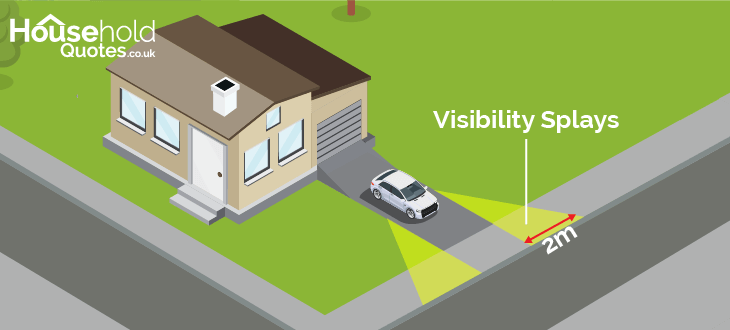
For single residential projects, pedestrian visibility splays are typically set at around 2 metres by 2 metres on either side of the entrance. These splays protect pedestrians using footpaths near driveway entrances.
When planning your driveway, it's essential to consider not only its appearance but also its practicality. Another critical factor to consider is the slope of your driveway.
If your driveway has a steep gradient ratio, it could damage the underside of your car and make it difficult for you or anyone with mobility issues to access your property. Additionally, if there's any rain, snow or ice on the paved area, it could become an even bigger problem.
To avoid these issues, it's recommended that your driveway should have a maximum gradient ratio of 1:6. This will help to protect your car from damage and make it easier for you to access your property.
To make your driveway safer and more practical, you can use slip-resistant materials that provide more grip to the user, such as gravel or resin-bound. This will ensure that your driveway is both safe and practical.
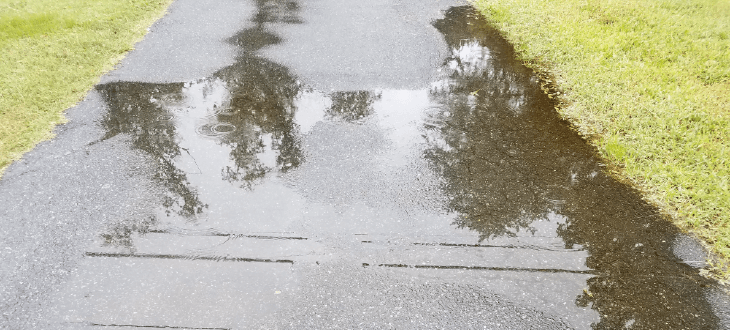
When installing a new driveway, it's important to ensure that water doesn't pool in and around your house, especially if it slopes towards it. Water can cause significant damage to your home's foundations, so taking precautions is essential.
Driveways should be laid with a minimum slope of 1:80 and a maximum of 1:12. If this slope is not possible, you can opt for porous materials like gravel or resin-bound to prevent water pooling.
If you prefer non-porous materials like tarmac, you'll need to install a drainage system at the end of your driveway to prevent water from accumulating. This will help prevent damage to your house and potential flooding.
In addition, you should consider installing edge restraints for your new driveway. These restraints may seem like a decorative feature, but they play a vital role in keeping your driveway structurally sound. Without them, your driveway will lose shape over time and form cracks.
Types of driveways in the UK
The types of driveway materials in the UK come in various styles and offer unique benefits and aesthetics. The most popular types of driveways as of 2024 are:
- Asphalt or Tarmac
- Block Paving
- Concrete
- Gravel (or crushed stone)
- Resin (bound or bonded)
- Bricks
- Indian Stone
- Cobblestone
Choosing the right driveway is crucial whether you want to increase the value of your property or create a functional parking space. You can choose from traditional options like asphalt and concrete driveways or more eco-friendly alternatives like gravel and permeable paving.
When deciding on the type of driveway that suits your needs and preferences, it is crucial to consider factors such as cost, durability, and visual appeal.
In the following sections, we will look at the most popular driveway choices in the UK.
Asphalt or Tarmac
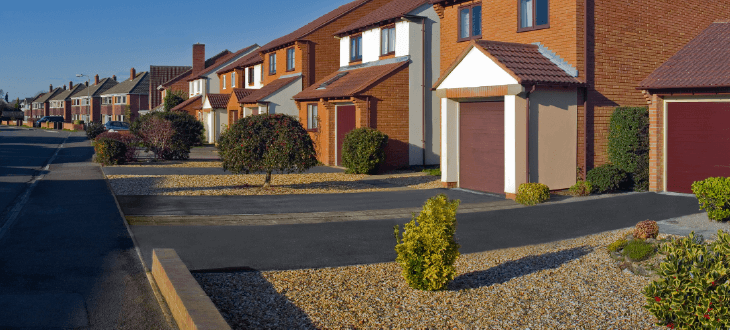
Over 95% of roads in the UK are made using asphalt, which is why asphalt, along with tarmac, is considered a classic and durable option for driveways.
Although similar, the binders that hold aggregates, such as crushed rock, gravel, and sand, differ. Asphalt uses a product of crude oil called bitumen, which binds the aggregates together. In contrast, tarmac uses tar, which is a by-product of coal.
There are several reasons why tarmac and asphalt are popular choices for driveways in the UK. Firstly, they provide smooth surfaces that increase accessibility to those with mobility issues. Secondly, they are cost-effective and require less maintenance than other driveways.
However, it is vital to consider these driveways' drawbacks before deciding based on your needs and requirements.
To help with this, we have compiled a list of pros and cons for both driveway types below:
Asphalt
| Pros | Cons |
|---|---|
| Quick installation | Customisation is limited |
| Cost-effective | Prone to cracks over time |
| Smooth appearance | Temperature sensitive |
| Durable | Environmentally harmful |
| Easy to maintain and repair | |
| Recyclable |
Given consistent maintenance, newly installed asphalt can last up to 20 years. Failure to do so can cause cracks, discolouration, and oil stains to appear on the surface.
Regular asphalt is not porous, as it is a hard surface which means that in order to prevent water from pooling, you will need to install a proper drainage system.
However, there is also a type of asphalt available called porous asphalt, designed explicitly with small voids that allow water to pass through them. Depending on your specific needs, you can choose either option accordingly.
Asphalt is a recyclable material that can be scraped and reused, making it a more eco-friendly option. However, the production of asphalt can be harmful to the environment.
To mitigate this, consider using warm-mix asphalt instead of hot-mix, which can significantly reduce energy consumption and carbon emissions. This not only helps the environment but can also be a cost-effective solution.
Tarmac
| Pros | Cons |
|---|---|
| Easy to install | Heat retention |
| Cost-effective | Prone to cracks and potholes |
| Durable | Not reusable |
| Versatile and smooth appearance | Damaged by oil stains |
| Low-maintenance | Harmful to the environment |
Tarmac driveways have a lifespan of 15 to 20 years, provided it receives proper maintenance. You can ensure that your tarmac driveway looks fresh and lasts longer by using sealant every 2 to 3 years.
Much like standard asphalt, tarmac is known to be hazardous to the environment. This is because coal, a nonrenewable resource, is used to produce it, and tar, a by-product of coal, results in significant carbon emissions.
In addition, tar tends to absorb pollutants like oil. Tar is impermeable and it does not allow rainwater to seep through it, resulting in the runoff getting polluted. This polluted water then flows into local sewage systems, ultimately affecting rivers and wildlife.
Block Paving
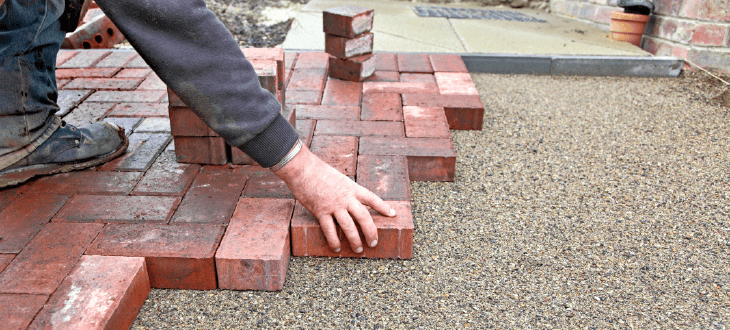
Block paving driveways are popular for their versatility and attractive appearance. This type of driveway is created by using individual blocks made from concrete.
Driveway paving stones can be laid in various patterns, allowing endless customisation. Block paving driveways can complement both traditional and modern homes. There are many benefits to block paving driveways and only a few disadvantages.
- A variety of colours and shapes are available
- You can choose the pattern to suit your home’s aesthetic
- The interlocking system provides additional strength
- Hard-wearing and durable
- Damaged blocks can be replaced individually
- Blocks can be made from recyclable or sustainable materials
Conventional block paving is not porous; however, more modern types are now permeable, which have wider gaps and joints specifically designed to drain rainwater to the base.
Block paving needs frequent maintenance, as the gaps between the blocks may accumulate debris and allow weeds and moss to grow, which can affect the shape and lifespan of your driveway. However, if you are set on the style of block paving, you can always add weed barriers to prevent the growth of weeds.
Furthermore, it is recommended to gently wash your block paving, as power washing can distort the colour of the blocks. While block paving driveways require periodic maintenance, such as sweeping and occasional weed removal, they can last several decades with proper care.
Although the initial installation cost may be higher than other driveways, the long-term durability and aesthetic appeal make it a worthwhile investment.
Concrete
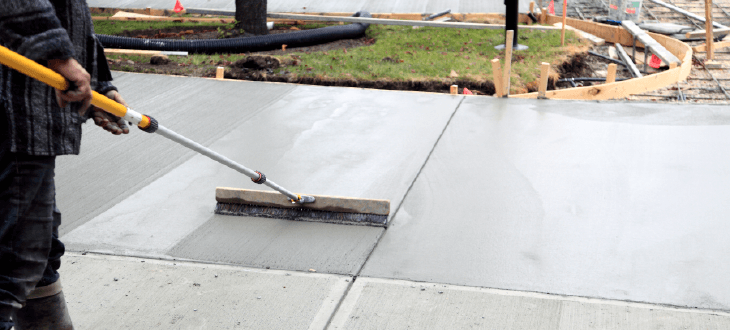
Concrete driveways are a great addition to any property. They offer a modern and sophisticated look that can enhance your home's curb appeal. The material is budget-friendly and creates a durable, sleek, elevated driveway that can handle heavy loads and harsh conditions.
Additionally, its smooth finish provides excellent accessibility for those with mobility aids. While you can choose porous concrete to help with drainage it may impact the strength of the driveway. Concrete has a lifespan of 20 to 30 years, making it a long-lasting and cost-effective option.
However, if your concrete driveway gets damaged, you must replace the entire driveway which can be expensive. Also, light-coloured concrete can easily stain, making your driveway look dirty and worn down.
One significant issue with concrete is its impact on the environment. Concrete production is responsible for 4-8% of the world's CO2 emissions and consumes 10% of the world's industrial water. Therefore, if you are looking for an eco-friendly driveway, concrete may not be the ideal choice for you.
Gravel (or crushed stones)
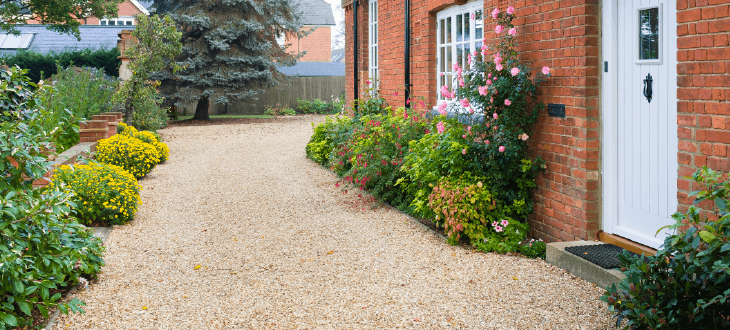
If you're looking for a driveway that's both rustic and budget-friendly, a gravel driveway might be the perfect choice. This type of driveway is made up of compacted and levelled loose gravel to create a stable surface. Gravel driveways are relatively easy to maintain and can be installed quickly.
One significant benefit of gravel driveways is that they are affordable. Compared to other driveways, they are often the least expensive option.
Moreover, gravel driveways are permeable, meaning rainwater can soak into the ground instead of contributing to surface water runoff, reducing the risk of flooding and replenishing groundwater levels.
Because of its natural properties, gravel is an ideal material for eco-friendly landscaping. It contributes to soil health, supports biodiversity, and can be sourced locally, thereby reducing the carbon footprint associated with transportation.
However, gravel can cause problems for people who use mobility aids because the loose material can make it challenging to move around and cause them to get stuck. Additionally, gravel can become slippery in rain, snow, and ice, increasing the risk of falls.
Gravel driveways are also challenging to maintain since the loose rocks can allow weeds to grow. However, you can install weed barriers to solve this issue. However, if you have mobility issues or simply don't have the time for upkeep, it may be better to consider other types of driveways.
Resin (bound or bonded)
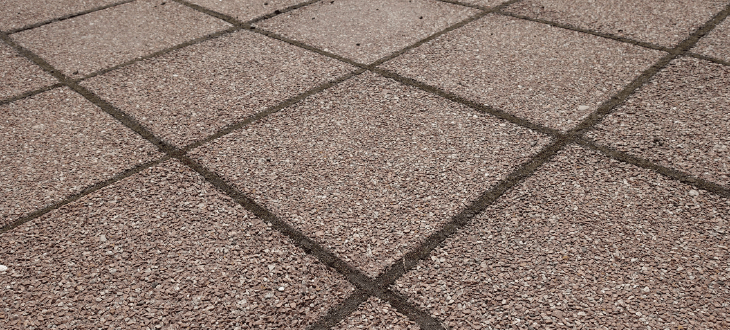
Resin driveways have recently gained popularity in the UK due to their seamless and decorative finishes. There are two types of resin driveways: “Resin bound and Resin bonded”. The difference between the two lies in how they are made and their qualities.
- Resin bonded driveways have stones scattered on top of the resin, providing a more textured feel. This type of driveway is an excellent choice for areas that include disabled ramps, allowing for a high level of grip. However, it is not a porous material, meaning a sufficient drainage system is required for this driveway.
- Resin bound driveways mix stone and resin together, which is then spread to create your driveway. The resin helps contain the stones and ensures they do not crumble away. It is a porous material that is excellent for drainage.
Resin driveways are more durable as they are less prone to cracking, fading, and oil stains than traditional driveways. If installed and maintained properly, they can last up to 25 years.
They are also made using recyclable materials such as plastic straws and shredded tyres, making them one of the most environmentally friendly driveway options available.
However, resin driveways have two main disadvantages. Firstly, they are expensive as the installation process is more complex than that of traditional driveways like gravel or concrete.
Secondly, resin driveways can withstand harsh weather conditions but can weaken under excessive usage. Heavy vehicles such as camper vans or trucks may cause cracks or lifting over time. Repairs for resin driveways can be expensive.
Bricks

Brick paving driveways are similar to block paving but they are made from natural clay instead of concrete. They are becoming increasingly popular in the UK because clay is a more sustainable, porous, and durable material, meaning brick driveways can last up to 25 years.
Because the clay used in the bricks is abundant and easy to excavate, brick driveways are an eco-friendly choice that can reduce carbon emissions and energy consumption.
With careful design and a non-slip sealant, brick driveways can provide excellent grip and accessibility for people with mobility aids or issues.
Furthermore, brick driveways can withstand heavy weight, making them ideal for those who use heavy vehicles or have a driveway with heavy usage.
Like block paving, brick driveways can be designed to suit your tastes. Still, they are limited to earthy colours, which may give you less creative freedom than concrete block paving.
The porous nature of clay means that brick driveways have excellent drainage, but if they are not regularly re-sealed or maintained, the bricks can quickly erode and damage the entire driveway.
Compared to block paving, brick driveways are considerably more expensive to install and maintain.
Indian Stone
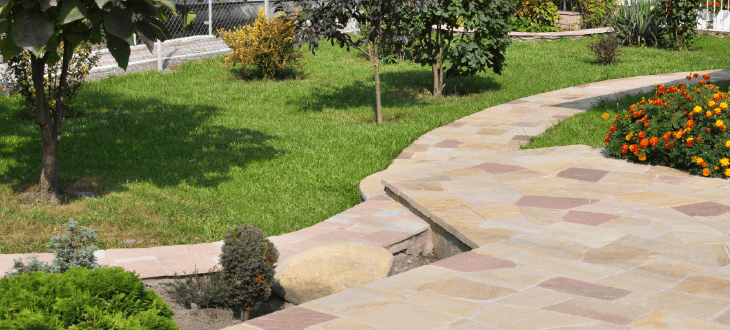
Indian stone is a type of natural sandstone formed over many years from quartz grains merging. Due to this natural process, each stone has a unique colour. Indian stone driveways are quite popular because they are affordable, are one of the cheapest materials available, and come in a wide range of unique colours.
As it is a soft stone, it can be cut into various shapes, which adds to the customisation of your driveway. However this soft stone can be prone to scratches, but it is still a durable stone that can resist cracking under a heavy load.
Indian stone is a natural product, so it is naturally porous. This provides excellent drainage to your driveway and creates a sleek look. However, this smooth stone can be slippery in winter conditions. To avoid falls, it is recommended to use non-slip sealants or opt for more textured versions of Indian stone.
Furthermore, sealants are recommended to prevent stains, as this stone's smooth and porous nature makes it prone to staining and allows the growth of moss and algae.
Although Indian stone's porous nature makes it more eco-friendly than nonporous driveways, the excavation and transportation of Indian stone can negatively impact the environment.
Indian stone is extracted in quarries, which can create large amounts of noise and air pollution, disrupt natural springs, and remove biodiversity from the area. Additionally, this material is transported from India, which increases greenhouse gases.
Cobblestone

Cobblestone driveways are an excellent way to add a traditional charm to your home. They have been used for centuries and are especially great for older homes looking for a more traditional feel.
Cobblestones are usually set in sand or mortar. They are made from granite and other natural stones, such as basalt or limestone. They are naturally porous, which allows water to filtrate to the ground below, reducing the risk of water damage, flooding, and erosion.
Cobblestone driveway costs are surprisingly cost-effective per square metre, which adds to their popularity. Besides being budget-friendly, they are also known for their strength and durability, with a lifespan of up to 25 to 60 years if maintained properly.
However, a significant issue with cobblestones is their uneven surfaces. It can be challenging to walk on and can slow down any mobility aid. Furthermore, driving on cobblestones can be bumpy due to the noise and vibrations created.
The uneven gaps in cobblestones also make walking them challenging during the winter months. Snow and ice can be particularly difficult to remove because of these gaps, increasing the risk of falls.
Furthermore, these gaps make it hard to maintain your driveway. Weeds and moss can grow, leaving a grubby-looking driveway. But more importantly, if you don't keep up with maintenance, weeds can cause structural damage to the driveway, which would require repair.
Due to their longevity and use of natural materials, cobblestone driveways are very eco-friendly. You can source reused cobblestones for your driveway, which will decrease your carbon footprint and reduce the cost of your driveway.
Selecting the appropriate driveway for your home
Choosing the right driveway for your home is an important decision that requires careful consideration. Your driveway not only affects the overall appearance of your property but also serves a functional purpose.
Below we will discuss the essential factors that you should consider when planning a new driveway
Aesthetic preferences
The aesthetic appeal of your driveway is another crucial factor to consider. The driveway is often one of the first things people notice about your home, so it's essential to choose a design that complements your property's overall style.
Driveways in the UK connected to more traditional homes, such as Victorian and Georgian styles, will suit brick paving, cobblestones, or gravel. Conversely, more modern homes can opt for concrete or resin. However, the aesthetics are completely up to you!
Whether you prefer a traditional and classic look or a more modern and sleek design, there are driveway options available to suit every aesthetic preference.
Maintenance
Maintenance is a crucial factor in extending the lifespan of your driveway. However, not all driveway materials require the same level of upkeep. Each type of material has varying maintenance requirements and long-term costs associated with it.
If you want a low-maintenance driveway, it's best to avoid block paving, brick, or gravel as they are susceptible to weed growth. Even with a weed barrier, you will still need to clean them regularly which may be challenging and time consuming. You can opt for a driveway cleaner but on average it will cost you about £300.
For driveways that require minimal upkeep, resin and concrete are your best options. They need very little maintenance, and cleaning usually involves a simple brush or wash with a mixture of water and bleach.
Size
One crucial factor to consider is size. Modern cars in the UK and EU are wider than they were in the past, with an average width of 180cm in the first half of 2023, according to the Guardian. Traditional driveways may not be able to accommodate larger cars, so it's important to create additional space for easy movement in and out of your driveway.
If you have two or more cars that you want to park in your driveway, then the length of your driveway is equally as important as the width.
Your driveway should be at least twice the length of a single car and provide enough space for two cars parked in tandem. This ensures that both cars can be accessed and moved without any obstacles.
Budget
Another critical consideration is your budget. Your budget is an important consideration when selecting a driveway for your home. Different driveway materials come with different price tags, so it's essential to determine how much you're willing to spend.
Remember that while some materials may have a higher upfront cost, they may require less maintenance in the long run, saving you money in the future.
For example, gravel driveways on average cost around £40 per m2 yet are challenging to maintain. On the other hand, block paving has a hefty price tag of £100 per m2. Yet, the upkeep is minimal and requires only a light wash occasionally.
Climate conditions
The climate conditions in your area should also influence your choice of driveway material. Different materials react differently to temperature changes, moisture, and other weather conditions.
For example, asphalt driveways are known for their durability and ability to withstand extreme weather conditions.Yet, tarmac reacts badly to high temperatures which causes it to become sticky.
While UK countries have relatively the same climate, hotter summers and harsher winters can decrease the lifespan of driveways.
Accessibility
Not all driveway materials are suitable for people with mobility issues. If you or someone in your family uses a mobility aid, driveways with uneven surfaces or large gaps, such as cobblestones or gravel, can cause significant problems when moving around.
It's also important to consider the size of your driveway, as narrow driveways can make it difficult to use.
To make your driveway more accessible, we recommend using materials such as tarmac, resin, or concrete, which facilitate easy movement.
Additionally, it's essential to consider the slope of your driveway and use a non-slip sealant to increase grip. Choosing wider driveways, reducing the slope, and selecting suitable materials can make your driveway accessible to everyone.
Understanding your new driveway's preferences and requirements can help you determine which material is best for you and your family.
Additionally, you must be aware of the local regulations and planning permissions for new driveways in the UK. These regulations and rules must be adhered to before any work can begin.
Driveways, planning permission and regulations
Driveways in the UK generally do not require planning permission, as they fall under permitted development. However, some regulations must be followed to ensure compliance with local authority rules. These include:
- Porous materials must be used in the construction of the driveway
- Rainwater must be drained through a soakaway or drainage system
- The size of the driveway must be under 5m2 if using non-porous materials
If your driveway does not comply with these regulations, you must apply for planning permission. This applies if the driveway is larger than 5m2, uses impermeable materials such as tarmac or conventional asphalt, impedes road visibility, or is attached to a listed building.
Additionally, if you plan to drop the kerb outside your property, you may also need to submit a planning application. Failure to comply with these regulations could result in a fine of up to £1000.
It is important to get in touch with your local authority to find out more about what kind of development is allowed and to determine whether your proposed driveway is within the permitted planning. To ease your worries, it is advisable to hire a professional driveway contractor to help you with this.
How much does a new driveway cost in the UK?
New driveway costs can vary depending on the size and material selected. If you are updating a current driveway, removing old materials will impact the overall cost.
The total cost of a new driveway, including labour and materials, generally ranges from £6,150 to £17,500. Larger areas will typically cost more. The type of material chosen for the driveway will also significantly impact the overall price.
Below is a breakdown of the cost per m2 of some new driveway materials:
| New driveway material | Average cost per m2 (materials only) |
|---|---|
| Tarmac or Asphalt | £60 |
| Concrete Block Paving | £35 |
| Concrete | £25 |
| Gravel | £35 |
| Resin (bonded or bound) | £60 |
| Bricks | £60 |
| Indian Stone | £26 |
| Cobblestone | £35 |
It's worth noting that material prices will increase depending on the thickness selected. This is especially true for concrete, where the thickness affects the durability of the driveway but also increases the price. Size is another important factor to consider, as a smaller driveway is more cost-effective. However, if you have multiple cars or larger vehicles, a larger driveway will be necessary.
Labour will also increase the cost. Complex driveways such as cobblestones have a cheaper material cost, but installation can cost between £70 to £150 per m2. Whereas gravel is a cheap material with low installation costs of £25 to £45 per m2 due to the simplicity of the driveway.
If you have an existing driveway and wish to replace it, you will need to factor in the removal cost. This can cost between £500 to £1,500, depending on the materials used and the driveway's size. Additionally, hiring skips is often necessary for driveway removal, which can cost between £200 to £250.
Considering all of these factors will enable you to plan your new driveway effectively. Whether you want a cost-effective tarmac driveway, a stylish block paving design, or a low-maintenance resin bound surface, there's a perfect option available for you.
Obtain multiple quotes for your driveway
It is crucial to conduct thorough research and obtain quotes from various contractors to ensure that you receive the best value for your money. Additionally, driveway quotes can be ambiguous and confusing. Avoid being overcharged and obtain multiple quotes for your driveway.
Quotes should be straightforward and prices should be explained in detail. Our service can provide you with four additional quotes from reputable contractors, so you do not have to contact companies and compare prices on your own. Click below to find out more.
- Describe your needs
- Get free quotes
- Choose the best offer
It only takes 30 seconds

FAQ
A driveway is a paved area outside your home that provides access to your car from a public street to the private paved area of your property.
No, you do not need planning permission to build a driveway. However, you must follow certain rules for your driveway to fall under permitted development guidelines. This includes having a driveway that is 5m2 or less, using porous materials, and having a sufficient drainage system in place. Failing to comply with these rules will require you to submit for planning approval.
Choosing the best driveway for you depends on your specific needs. There is no one-size-fits-all solution. Each driveway type has its pros and cons. For example, asphalt and tarmac are the most popular driveways in the UK but have their downsides, such as being impermeable and having damaging effects on the environment.
Gravel is cost-effective but can affect movement for those with mobility issues. The best driveway for you is the one that closely fits your needs.
A new driveway in the UK costs between £6,150 to £17,500. The price is affected by the size of your driveway and the materials you decide to use. Larger driveways made with high-quality materials such as block paving will increase the overall cost.
The cheapest driveway in the UK is gravel. Between material and installation costs, the overall price of a gravel driveway is far more cost-effective than other driveways in the UK market.

Caoimhe is an experienced content writer and researcher who is passionate about providing accessible information to every reader. With a background in English literature and Sociology, she combines the two disciplines to create cohesive, well-thought-out, and well-informed pieces.
